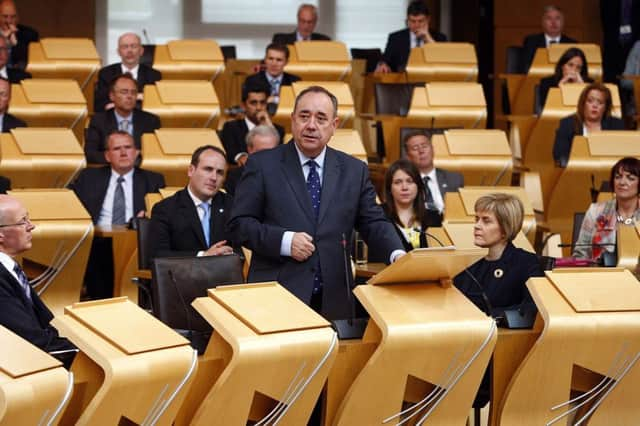Move on and accept referendum result, Salmond told


The First Minister’s opponents urged the SNP to “move on” after last week’s vote, saying that the referendum had confirmed that remaining in the United Kingdom was the settled will of the Scottish people.
Scottish Labour leader Johann Lamont, Conservative leader Ruth Davidson and Liberal Democrat leader Willie Rennie made the point after Mr Salmond raised the prospect of Scotland unilaterally declaring independence.
Advertisement
Hide AdAdvertisement
Hide AdDuring the opening session of a two-day debate to discuss the independence referendum, there was consensus across the chamber that the experiment to extend the vote to 16- and 17-year-olds should be adopted for future elections. And on the same day that all main Holyrood parties had talks with a newly established commission looking at strengthening the Scottish Parliament, Mr Salmond said the UK parties’ vow for more powers must be delivered.
Last night the SNP said it would “fully participate” with the commission after Mr Salmond said there was a “great opportunity” for the Scottish Parliament to help deliver more powers, arguing that they should create jobs, tackle inequality and give Scotland a stronger voice on the international stage.
The First Minister sought to distance himself from suggestions that Scotland could become independent in the future without the decision being taken in a referendum.
Mr Salmond said he had “no intention” to make a unilateral declaration of independence – a statement which appeared to differ from comments he made at the weekend.
On Sunday, Mr Salmond suggested there could be a gradual approach to independence, whereby Scotland could declare itself to be independent, because the parliament had gathered so many powers that it became “independent in all but name”.
His remarks were referred to by his opponents, who all called on the SNP to accept defeat.
Ms Lamont said: “The constitutional question has hung over this country all of my life, and I give absolute credit to the First Minister for giving the people of Scotland the opportunity to answer it.
Advertisement
Hide AdAdvertisement
Hide Ad“While he might not have got the result he was looking for, we can all agree that the United Kingdom is now the settled will of the Scottish people.
“No longer will the UK be a deal struck by the privileged few. It is now the choice of the many, expressed in a fair and democratic way, in which we can all have confidence.”
She added: “We cannot spend the next two years, having moved from, ‘If you vote Yes this will happen’, to ‘If you had voted Yes that would have happened’. We cannot leave the politics of the place in that shape. We need to move on.”
Ms Davidson said she understood the “hurt, grief and loss” of those who voted for independence. “But that pain is not healed by people crying foul and that grief is not ministered to by talk of a conspiracy,” she said.
“To truly come back together and move on, we need the Scottish Government to acknowledge that the process was not flawed.”
She added: “Since Friday, we have had three senior nationalists, including the First Minister himself, saying there are other ways to unilaterally declare independence.
“We need those at the top to respect and accept the result. Because without such acceptance, we cannot move on. And move on we must.”
Mr Rennie spoke on a similar theme, saying that the question of independence had been “laid to rest”.
Advertisement
Hide AdAdvertisement
Hide AdEarlier in the day, Lord Smith of Kelvin, the peer leading the commission set up to deliver more powers for Scotland, met politicians including the SNP finance secretary John Swinney.
Lord Smith said: “Following the referendum, we have a willingness, shared by all five of Scotland’s main political parties, to strengthen the powers of the Scottish Parliament.
“My message today to the political parties is a simple one: Scotland expects you to now come together, work together and agree the detail of what those powers should be.
“Time is tight but this is not an exercise in thinking about what we could do. That has been done. It is about agreeing on what we will do.”
Lord Smith is to invite each party to nominate two representatives, at least one of whom should be a member of the Scottish Parliament, to take part in the cross-party talks. Each party is also being asked to prepare a written submission on their views on strengthening the Scottish Parliament within the United Kingdom. The names of the party representatives will be published by the end of the week.
Scottish civic institutions and business groups will also be asked for their views on strengthening Holyrood powers.
Next week, the commission will set out the process for individual Scots to share their views on the issue.
Addressing MSPs, Mr Salmond said: “Overall, there is a great opportunity for this parliament, together, to help the UK government deliver its promise of significant extra powers for this chamber.”